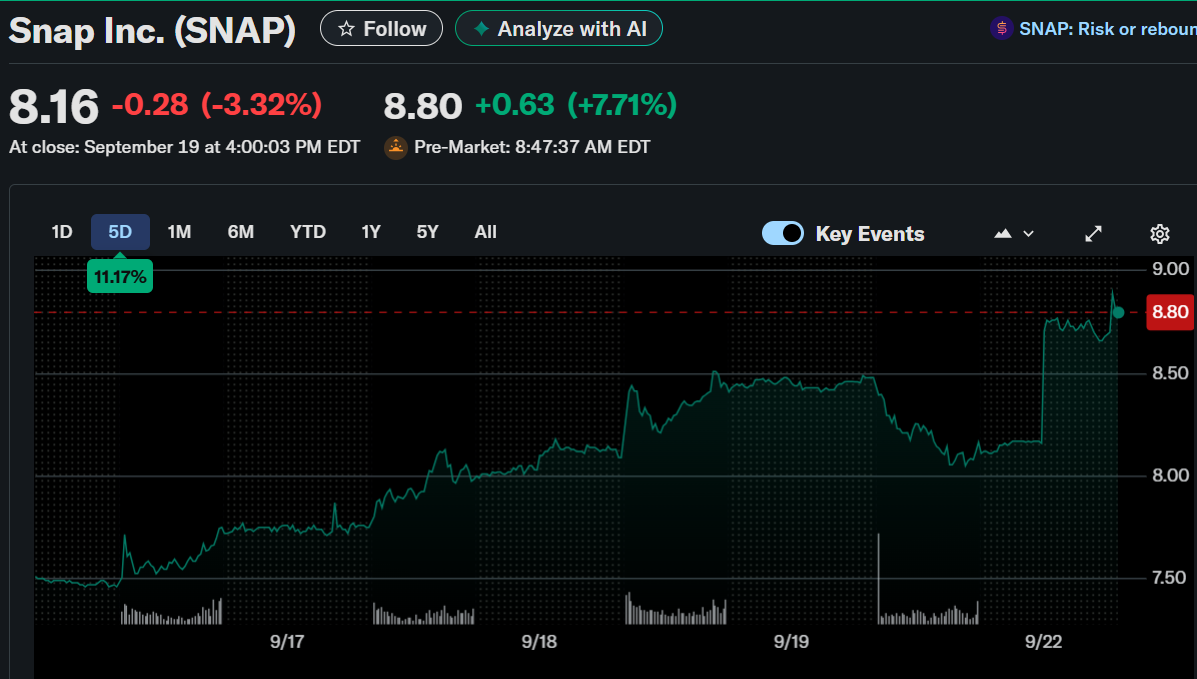Snap Inc. (NYSE: SNAP) closed at $8.16 on September 19, 2025, down 3.32%, before bouncing 6.61% in pre-market trading to $8.71 on September 22nd.

The rally followed the unveiling of fifth-generation Spectacles and Snap OS 2.0, which received strong positive feedback from marketers. Despite this optimism, Snap’s second-quarter earnings in early August missed Wall Street expectations, reinforcing concerns about profitability.
Snap’s latest updates highlight its commitment to augmented reality. The company announced a 2026 public launch timeline for Spectacles AR glasses, aiming to convert its youthful user base into future AR revenue streams. The integration of Snap OS 2.0 builds a foundation for immersive content consumption, aligning with industry trends that could one day replace smartphones. Marketers have expressed enthusiasm about Snap’s advertising potential, positioning the company as a distinct player alongside rivals Meta and TikTok.
To invest in Snap, shareholders must believe product innovation and AR momentum can translate into sustainable growth. Despite market excitement, Snap remains unprofitable, reporting a net income loss of $546.3 million over the past year. With a profit margin of -9.69% and return on equity of -26.42%, financial fundamentals continue to weigh on sentiment.
Snap projects $7.5 billion in revenue and $827.3 million in earnings by 2028, which requires consistent double-digit growth and improved monetization. Yet, risks such as legal challenges, including a class action lawsuit over advertising revenue statements, add uncertainty to its long-term narrative.
Thirteen private investors in the Simply Wall St Community estimated Snap’s fair value between $8.23 and $18.82 per share, highlighting divided views. Snap trades at a forward P/E of 22.68 and a price-to-sales ratio of 2.43, suggesting valuation may already price in future growth.
Performance metrics show weakness compared to broader markets. Year-to-date, SNAP has declined 24.23%, while the S&P 500 gained 13.31%. Its five-year return of -65.74% sharply underperformed the index’s 100.77% gain, underscoring the challenge of reversing long-term underperformance.
Snap maintains $2.89 billion in cash against a high debt-to-equity ratio of 202.57%, reflecting leveraged operations. While free cash flow of $539.3 million supports liquidity, reliance on advertising revenue keeps profitability volatile. Q2 2025 earnings, with $1.34 billion revenue and $0 EPS, fell short of analyst expectations, exposing fragility in its growth model.
Snap’s resurgence in pre-market trading shows investors are encouraged by AR innovation and marketer support. Yet, persistent losses, regulatory issues, and competitive pressure mean the bull case depends heavily on successful AR adoption and revenue conversion. Investors remain split, with wide valuation ranges reflecting both optimism and skepticism about Snap’s future.
The post Snap Inc. ($SNAP) Stock: Rises After Unveiling New Spectacles and Snap OS 2.0 Despite Ongoing Challenges appeared first on CoinCentral.
Also read: Shiba Inu price drops 6% as governance and DeFi plans advance